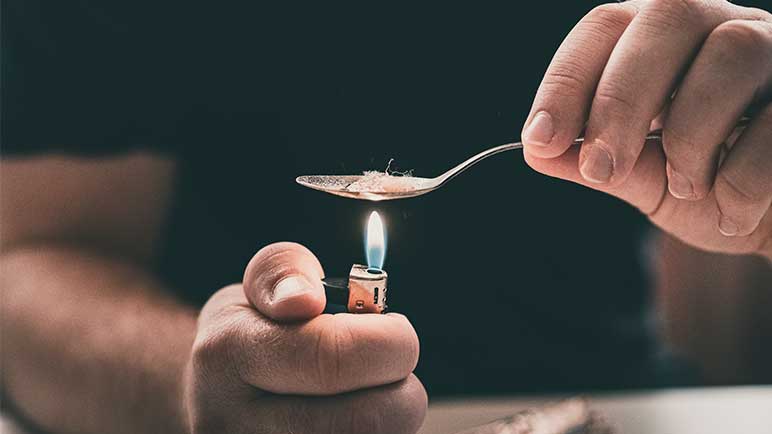Heroin Use In Ohio | What You Need To Know

Medically Reviewed By: Kimberly Langdon, M.D.
While heroin causes issues all over the country, it’s been particularly problematic in Ohio. People who use heroin face a high risk of both addiction and overdose.

Heroin is an opioid drug made from the opiate (natural opioid) morphine. It causes a rush of relaxation and joy. However, it also poses a high risk of serious health problems, including drug addiction (also called substance use disorder) and overdose.
While heroin causes issues all over the country, it’s been particularly problematic in Ohio.
Heroin Use In Ohio
Ohio is considered “ground zero” for the opioid crisis.
In 2015, 3,050 Ohioans died of opioid overdoses, the highest opioid death rate in the country. Similarly, opioid drug overdose deaths in Cuyahoga County, Ohio’s largest county, increased 1000 percent between 2007 and 2016.
Many opioid overdoses involve heroin. Often, people become addicted to prescription opioids such as oxycodone (OxyContin), oxymorphone (Opana), and hydrocodone (Vicodin).
When their prescriptions run out, they may turn to heroin as a cheaper and more accessible alternative. Indeed, on the street, a small bag of heroin can cost as little as $5. In contrast, a single oxycodone pill often costs $20.
Heroin, Stress, & Mental Health
Like people in other states, Ohioans report higher rates of heroin use during times of stress.
For example, in the first few months of the COVID-19 pandemic, heroin use in Ohio increased 35 percent. This is because some people see heroin as a cheap way to ease anxiety, depression, loneliness, and other mental health concerns.
Unfortunately, while heroin might not be expensive, it’s among the most dangerous opioids.
Dangers Of Heroin
People who use heroin face a high risk of both addiction and overdose.
Addiction
Heroin is usually snorted, injected, or smoked. All of these methods send the drug to your brain very quickly, which makes it highly addictive. Heroin addiction is a serious disease that makes you feel unable to stop using heroin. Other symptoms include:
- mood swings
- sudden shifts in energy levels
- avoidance of friends and family members
- decline in personal hygiene
- unexplained bruises, scars, and scabs (from injecting heroin)
- loss of interest in activities once enjoyed
- loss of motivation
- tolerance (needing increasingly larger or more frequent amounts of heroin to feel the desired effects)
- physical dependence (experiencing withdrawal symptoms, such as anxiety and shaking, when you don’t use heroin)
People with symptoms of heroin addiction should seek help at a substance abuse treatment program.
Overdose
A heroin overdose occurs when you use enough of the drug to produce life-threatening symptoms. Since the drug is so powerful, you could overdose when using heroin for the first time.
Common signs of heroin overdose include:
- smaller pupils
- slurred speech
- nausea and vomiting
- bluish lips and/or fingernails
- pale skin
- low blood pressure
- weak pulse
- shallow breathing
If you or someone you know experiences these symptoms, call 911 right away. You should also administer naloxone if you have it.
Naloxone (brand name Narcan) is a medication that can quickly reverse the effects of an opioid overdose. You can get it from most pharmacies without a prescription.
Fentanyl-Laced Heroin
Although heroin itself is highly dangerous, the drug becomes even more deadly when it’s laced with fentanyl. Fentanyl is a synthetic (human-made) opioid that’s up to 50 times stronger than heroin.
In recent years, many drug traffickers have started lacing heroin with fentanyl to give buyers a stronger high and cut production costs since fentanyl is very cheap to manufacture.
Most drug dealers don’t tell buyers when a drug contains fentanyl. That means that every time you buy heroin, you could unknowingly ingest fentanyl.
Other Health Problems
Along with addiction and overdose, heroin can also cause:
- dry mouth
- severe itching
- stomach cramps
- constipation
- shifting between being conscious and semiconscious (also called “going on the nod”)
- trouble sleeping
- depression
- damaged nasal tissues from snorting or sniffing heroin
- collapsed veins from injecting heroin
- infectious diseases like HIV and hepatitis C from sharing needles or other heroin paraphernalia
- kidney and liver disease
- pneumonia and other lung complications
- heart infections
Heroin Abuse Treatment Options
If you or a loved one struggles with heroin, contact a drug addiction treatment center. These centers offer a variety of evidence-based treatments, including:
- medical detox, in which health care providers help you quit heroin with minimal withdrawal symptoms
- mental health counseling, in which a therapist will help you manage heroin cravings and any underlying mental health conditions that may have contributed to your drug abuse
- support groups, where you can discuss your experiences with other people recovering from drug problems
- aftercare planning, in which health care providers will identify strategies to promote your long-term recovery, such as regular exercise, housing assistance, and ongoing therapy
To learn more about opioid abuse treatment options, please contact Ohio Recovery Center. Our inpatient treatment programs offer personalized, comprehensive care to help you or your loved one stay drug-free.
- Centers for Disease Control and Prevention - Fentanyl Facts https://www.cdc.gov/stopoverdose/fentanyl/index.html
- The Columbus Dispatch - Signs of illegal drug use surge in Ohio as 'collateral damage' from pandemic https://www.dispatch.com/story/news/drugs/2020/07/08/signs-of-illegal-drug-use-surge-in-ohio-as-collateral-damage-from-pandemic/42077773/
- National Institute on Drug Abuse - Heroin DrugFacts https://nida.nih.gov/publications/drugfacts/heroin
- NBC4 Columbus - Montgomery County, Ohio, tops in U.S. for overdose deaths https://www.nbc4i.com/news/montgomery-county-ohio-tops-in-u-s-for-overdose-deaths/
- Ohio State University - Opioid Epidemic in Ohio – Extension in Action https://extension.osu.edu/about/resources/opioid-epidemic-ohio-%E2%80%93-extension-action
- United States Department of Justice - Heroin Epidemic https://www.justice.gov/usao-ndoh/heroin-epidemic

